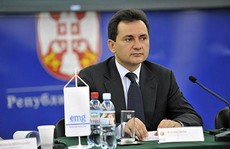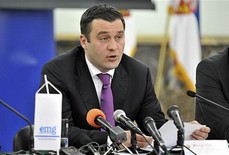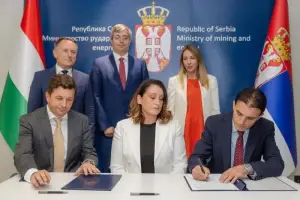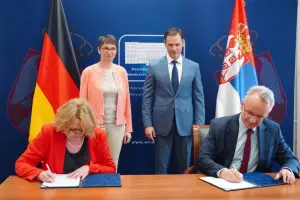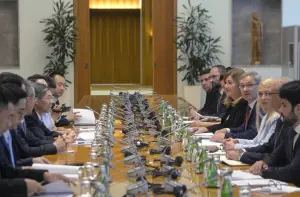Q:
A:
EIB to release new loans for exporters as of September
Belgrade,
29 June 2011
Deputy Prime Minister for European Integration Bozidar Djelic today called on representatives of the 100 biggest Serbian exporters to prepare projects and apply for loans from Apex IV credit line of the European Investment Bank (EIB) worth around €250 million.
Speaking at the conference "How to increase exports of Serbia - in step with Europe", organised by the Ekonomist Media Group, Djelic explained that these loans will be approved as of September and are intended primarily for companies that specialise in exports.
The loans will have a 12-year repayment period, a four-year grace period and an interest rate of maximum 4% at annual level. According to him, the goal of government is to increase exports from the current level of approximately 40% of GDP to at least 50%, stressing that the primary goal of these loans is the increase of exports, and the secondary goal is employment.
Djelic said that the loans will be secured by guarantees from the state and the maximum amount of an individual loan will be €12.5 million.
Taking into account that the state will give guarantees, commercial banks will be able to approve such loans without asking for additional collateral, he pointed out and noted that this is very important for the leading exporters.
The Serbian government followed the model of Slovakia when drafting this plan, because this country had an export deficit ten years ago, whereas today its exports stand at 110% of GDP, Djelic said and added that the largest amount of Serbia’s exports go to EU countries and CEFTA. The current export to import ratio with EU countries is approximately 60%, with Italy being on the top of the ladder where this ratio is more than 90% and with the prospect of exceeding 100% when factory Fiat Automobili Srbija starts working with full force. The situation of export to import ratio with CEFTA countries is much better and it exceeds 190%, the Deputy Prime Minister said and specified that it is mainly about export of agricultural products.
The loans will have a 12-year repayment period, a four-year grace period and an interest rate of maximum 4% at annual level. According to him, the goal of government is to increase exports from the current level of approximately 40% of GDP to at least 50%, stressing that the primary goal of these loans is the increase of exports, and the secondary goal is employment.
Djelic said that the loans will be secured by guarantees from the state and the maximum amount of an individual loan will be €12.5 million.
Taking into account that the state will give guarantees, commercial banks will be able to approve such loans without asking for additional collateral, he pointed out and noted that this is very important for the leading exporters.
The Serbian government followed the model of Slovakia when drafting this plan, because this country had an export deficit ten years ago, whereas today its exports stand at 110% of GDP, Djelic said and added that the largest amount of Serbia’s exports go to EU countries and CEFTA. The current export to import ratio with EU countries is approximately 60%, with Italy being on the top of the ladder where this ratio is more than 90% and with the prospect of exceeding 100% when factory Fiat Automobili Srbija starts working with full force. The situation of export to import ratio with CEFTA countries is much better and it exceeds 190%, the Deputy Prime Minister said and specified that it is mainly about export of agricultural products.
Minister of Economy and Regional Development Nebojsa Ciric announced that from this EIB credit line approximately €100 million will be earmarked for strengthening export activities of small and medium-sized enterprises.
Ciric said that in the first five months of this year, trade with the world amounted to approximately €7.2 billion, with exports growing at the rate of 24.5% and imports at around 27%.
He described as disturbing the fact that 70% of exports are semi-manufactured articles, raw materials and intermediate goods, while 20% are services. He reiterated that the government’s long-term objective is to strengthen the exports of automotive and computer industries and of electronic equipment.
We have already achieved positive results in the export of car cables in the amount of approximately €120 million owing first of all to companies LEONI, Draexlmaier and Yura. Ciric told reporters after the meeting that excessive daily fluctuations in the dinar exchange rate do great damage to the export economy and reiterated that it is very important that the exchange rate is stable.
Speaking about controversial privatisations, Ciric said that the state has so far terminated approximately 30% of the disputed contracts and added that all those who committed abuses during privatisation should be held accountable.
In some cases the state confiscated property that had been obtained through crime and abuse in the privatisation, he recalled and added that so far the government has not formed a working group which would examine such cases because the competent state institutions were doing their job.
He described as disturbing the fact that 70% of exports are semi-manufactured articles, raw materials and intermediate goods, while 20% are services. He reiterated that the government’s long-term objective is to strengthen the exports of automotive and computer industries and of electronic equipment.
We have already achieved positive results in the export of car cables in the amount of approximately €120 million owing first of all to companies LEONI, Draexlmaier and Yura. Ciric told reporters after the meeting that excessive daily fluctuations in the dinar exchange rate do great damage to the export economy and reiterated that it is very important that the exchange rate is stable.
Speaking about controversial privatisations, Ciric said that the state has so far terminated approximately 30% of the disputed contracts and added that all those who committed abuses during privatisation should be held accountable.
In some cases the state confiscated property that had been obtained through crime and abuse in the privatisation, he recalled and added that so far the government has not formed a working group which would examine such cases because the competent state institutions were doing their job.

